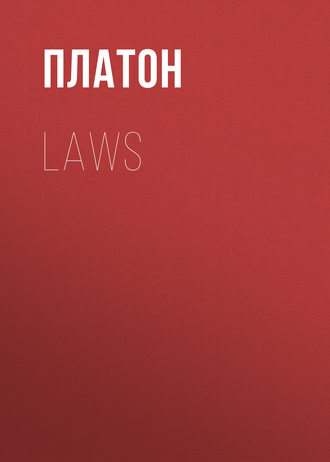
Платон
Laws
In the next place, we have to consider what sort of property will be most convenient. There is no difficulty either in understanding or acquiring most kinds of property, but there is great difficulty in what relates to slaves. And the reason is, that we speak about them in a way which is right and which is not right; for what we say about our slaves is consistent and also inconsistent with our practice about them.
MEGILLUS: I do not understand, Stranger, what you mean.
ATHENIAN: I am not surprised, Megillus, for the state of the Helots among the Lacedaemonians is of all Hellenic forms of slavery the most controverted and disputed about, some approving and some condemning it; there is less dispute about the slavery which exists among the Heracleots, who have subjugated the Mariandynians, and about the Thessalian Penestae. Looking at these and the like examples, what ought we to do concerning property in slaves? I made a remark, in passing, which naturally elicited a question about my meaning from you. It was this: – We know that all would agree that we should have the best and most attached slaves whom we can get. For many a man has found his slaves better in every way than brethren or sons, and many times they have saved the lives and property of their masters and their whole house – such tales are well known.
MEGILLUS: To be sure.
ATHENIAN: But may we not also say that the soul of the slave is utterly corrupt, and that no man of sense ought to trust them? And the wisest of our poets, speaking of Zeus, says:
'Far-seeing Zeus takes away half the understanding of men whom the day of slavery subdues.'
Different persons have got these two different notions of slaves in their minds – some of them utterly distrust their servants, and, as if they were wild beasts, chastise them with goads and whips, and make their souls three times, or rather many times, as slavish as they were before; – and others do just the opposite.
MEGILLUS: True.
CLEINIAS: Then what are we to do in our own country, Stranger, seeing that there are such differences in the treatment of slaves by their owners?
ATHENIAN: Well, Cleinias, there can be no doubt that man is a troublesome animal, and therefore he is not very manageable, nor likely to become so, when you attempt to introduce the necessary division of slave, and freeman, and master.
CLEINIAS: That is obvious.
ATHENIAN: He is a troublesome piece of goods, as has been often shown by the frequent revolts of the Messenians, and the great mischiefs which happen in states having many slaves who speak the same language, and the numerous robberies and lawless life of the Italian banditti, as they are called. A man who considers all this is fairly at a loss. Two remedies alone remain to us, – not to have the slaves of the same country, nor if possible, speaking the same language (compare Aris. Pol.); in this way they will more easily be held in subjection: secondly, we should tend them carefully, not only out of regard to them, but yet more out of respect to ourselves. And the right treatment of slaves is to behave properly to them, and to do to them, if possible, even more justice than to those who are our equals; for he who naturally and genuinely reverences justice, and hates injustice, is discovered in his dealings with any class of men to whom he can easily be unjust. And he who in regard to the natures and actions of his slaves is undefiled by impiety and injustice, will best sow the seeds of virtue in them; and this may be truly said of every master, and tyrant, and of every other having authority in relation to his inferiors. Slaves ought to be punished as they deserve, and not admonished as if they were freemen, which will only make them conceited. The language used to a servant ought always to be that of a command (compare Arist. Pol.), and we ought not to jest with them, whether they are males or females – this is a foolish way which many people have of setting up their slaves, and making the life of servitude more disagreeable both for them and for their masters.
CLEINIAS: True.
ATHENIAN: Now that each of the citizens is provided, as far as possible, with a sufficient number of suitable slaves who can help him in what he has to do, we may next proceed to describe their dwellings.
CLEINIAS: Very good.
ATHENIAN: The city being new and hitherto uninhabited, care ought to be taken of all the buildings, and the manner of building each of them, and also of the temples and walls. These, Cleinias, were matters which properly came before the marriages; – but, as we are only talking, there is no objection to changing the order. If, however, our plan of legislation is ever to take effect, then the house shall precede the marriage if God so will, and afterwards we will come to the regulations about marriage; but at present we are only describing these matters in a general outline.
CLEINIAS: Quite true.
ATHENIAN: The temples are to be placed all round the agora, and the whole city built on the heights in a circle (compare Arist. Pol.), for the sake of defence and for the sake of purity. Near the temples are to be placed buildings for the magistrates and the courts of law; in these plaintiff and defendant will receive their due, and the places will be regarded as most holy, partly because they have to do with holy things: and partly because they are the dwelling-places of holy Gods: and in them will be held the courts in which cases of homicide and other trials of capital offences may fitly take place. As to the walls, Megillus, I agree with Sparta in thinking that they should be allowed to sleep in the earth, and that we should not attempt to disinter them (compare Arist. Pol.); there is a poetical saying, which is finely expressed, that 'walls ought to be of steel and iron, and not of earth;' besides, how ridiculous of us to be sending out our young men annually into the country to dig and to trench, and to keep off the enemy by fortifications, under the idea that they are not to be allowed to set foot in our territory, and then, that we should surround ourselves with a wall, which, in the first place, is by no means conducive to the health of cities, and is also apt to produce a certain effeminacy in the minds of the inhabitants, inviting men to run thither instead of repelling their enemies, and leading them to imagine that their safety is due not to their keeping guard day and night, but that when they are protected by walls and gates, then they may sleep in safety; as if they were not meant to labour, and did not know that true repose comes from labour, and that disgraceful indolence and a careless temper of mind is only the renewal of trouble. But if men must have walls, the private houses ought to be so arranged from the first that the whole city may be one wall, having all the houses capable of defence by reason of their uniformity and equality towards the streets (compare Arist. Pol.). The form of the city being that of a single dwelling will have an agreeable aspect, and being easily guarded will be infinitely better for security. Until the original building is completed, these should be the principal objects of the inhabitants; and the wardens of the city should superintend the work, and should impose a fine on him who is negligent; and in all that relates to the city they should have a care of cleanliness, and not allow a private person to encroach upon any public property either by buildings or excavations. Further, they ought to take care that the rains from heaven flow off easily, and of any other matters which may have to be administered either within or without the city. The guardians of the law shall pass any further enactments which their experience may show to be necessary, and supply any other points in which the law may be deficient. And now that these matters, and the buildings about the agora, and the gymnasia, and places of instruction, and theatres, are all ready and waiting for scholars and spectators, let us proceed to the subjects which follow marriage in the order of legislation.
CLEINIAS: By all means.
ATHENIAN: Assuming that marriages exist already, Cleinias, the mode of life during the year after marriage, before children are born, will follow next in order. In what way bride and bridegroom ought to live in a city which is to be superior to other cities, is a matter not at all easy for us to determine. There have been many difficulties already, but this will be the greatest of them, and the most disagreeable to the many. Still I cannot but say what appears to me to be right and true, Cleinias.
CLEINIAS: Certainly.
ATHENIAN: He who imagines that he can give laws for the public conduct of states, while he leaves the private life of citizens wholly to take care of itself; who thinks that individuals may pass the day as they please, and that there is no necessity of order in all things; he, I say, who gives up the control of their private lives, and supposes that they will conform to law in their common and public life, is making a great mistake. Why have I made this remark? Why, because I am going to enact that the bridegrooms should live at the common tables, just as they did before marriage. This was a singularity when first enacted by the legislator in your parts of the world, Megillus and Cleinias, as I should suppose, on the occasion of some war or other similar danger, which caused the passing of the law, and which would be likely to occur in thinly-peopled places, and in times of pressure. But when men had once tried and been accustomed to a common table, experience showed that the institution greatly conduced to security; and in some such manner the custom of having common tables arose among you.
CLEINIAS: Likely enough.
ATHENIAN: I said that there may have been singularity and danger in imposing such a custom at first, but that now there is not the same difficulty. There is, however, another institution which is the natural sequel to this, and would be excellent, if it existed anywhere, but at present it does not. The institution of which I am about to speak is not easily described or executed; and would be like the legislator 'combing wool into the fire,' as people say, or performing any other impossible and useless feat.
CLEINIAS: What is the cause, Stranger, of this extreme hesitation?
ATHENIAN: You shall hear without any fruitless loss of time. That which has law and order in a state is the cause of every good, but that which is disordered or ill-ordered is often the ruin of that which is well-ordered; and at this point the argument is now waiting. For with you, Cleinias and Megillus, the common tables of men are, as I said, a heaven-born and admirable institution, but you are mistaken in leaving the women unregulated by law. They have no similar institution of public tables in the light of day, and just that part of the human race which is by nature prone to secrecy and stealth on account of their weakness – I mean the female sex – has been left without regulation by the legislator, which is a great mistake. And, in consequence of this neglect, many things have grown lax among you, which might have been far better, if they had been only regulated by law; for the neglect of regulations about women may not only be regarded as a neglect of half the entire matter (Arist. Pol.), but in proportion as woman's nature is inferior to that of men in capacity for virtue, in that degree the consequence of such neglect is more than twice as important. The careful consideration of this matter, and the arranging and ordering on a common principle of all our institutions relating both to men and women, greatly conduces to the happiness of the state. But at present, such is the unfortunate condition of mankind, that no man of sense will even venture to speak of common tables in places and cities in which they have never been established at all; and how can any one avoid being utterly ridiculous, who attempts to compel women to show in public how much they eat and drink? There is nothing at which the sex is more likely to take offence. For women are accustomed to creep into dark places, and when dragged out into the light they will exert their utmost powers of resistance, and be far too much for the legislator. And therefore, as I said before, in most places they will not endure to have the truth spoken without raising a tremendous outcry, but in this state perhaps they may. And if we may assume that our whole discussion about the state has not been mere idle talk, I should like to prove to you, if you will consent to listen, that this institution is good and proper; but if you had rather not, I will refrain.
CLEINIAS: There is nothing which we should both of us like better, Stranger, than to hear what you have to say.
ATHENIAN: Very good; and you must not be surprised if I go back a little, for we have plenty of leisure, and there is nothing to prevent us from considering in every point of view the subject of law.
CLEINIAS: True.
ATHENIAN: Then let us return once more to what we were saying at first. Every man should understand that the human race either had no beginning at all, and will never have an end, but always will be and has been; or that it began an immense while ago.
CLEINIAS: Certainly.
ATHENIAN: Well, and have there not been constitutions and destructions of states, and all sorts of pursuits both orderly and disorderly, and diverse desires of meats and drinks always, and in all the world, and all sorts of changes of the seasons in which animals may be expected to have undergone innumerable transformations of themselves?
CLEINIAS: No doubt.
ATHENIAN: And may we not suppose that vines appeared, which had previously no existence, and also olives, and the gifts of Demeter and her daughter, of which one Triptolemus was the minister, and that, before these existed, animals took to devouring each other as they do still?
CLEINIAS: True.
ATHENIAN: Again, the practice of men sacrificing one another still exists among many nations; while, on the other hand, we hear of other human beings who did not even venture to taste the flesh of a cow and had no animal sacrifices, but only cakes and fruits dipped in honey, and similar pure offerings, but no flesh of animals; from these they abstained under the idea that they ought not to eat them, and might not stain the altars of the Gods with blood. For in those days men are said to have lived a sort of Orphic life, having the use of all lifeless things, but abstaining from all living things.
CLEINIAS: Such has been the constant tradition, and is very likely true.
ATHENIAN: Some one might say to us, What is the drift of all this?
CLEINIAS: A very pertinent question, Stranger.
ATHENIAN: And therefore I will endeavour, Cleinias, if I can, to draw the natural inference.
CLEINIAS: Proceed.
ATHENIAN: I see that among men all things depend upon three wants and desires, of which the end is virtue, if they are rightly led by them, or the opposite if wrongly. Now these are eating and drinking, which begin at birth – every animal has a natural desire for them, and is violently excited, and rebels against him who says that he must not satisfy all his pleasures and appetites, and get rid of all the corresponding pains – and the third and greatest and sharpest want and desire breaks out last, and is the fire of sexual lust, which kindles in men every species of wantonness and madness. And these three disorders we must endeavour to master by the three great principles of fear and law and right reason; turning them away from that which is called pleasantest to the best, using the Muses and the Gods who preside over contests to extinguish their increase and influx.
But to return: – After marriage let us speak of the birth of children, and after their birth of their nurture and education. In the course of discussion the several laws will be perfected, and we shall at last arrive at the common tables. Whether such associations are to be confined to men, or extended to women also, we shall see better when we approach and take a nearer view of them; and we may then determine what previous institutions are required and will have to precede them. As I said before, we shall see them more in detail, and shall be better able to lay down the laws which are proper or suited to them.
CLEINIAS: Very true.
ATHENIAN: Let us keep in mind the words which have now been spoken; for hereafter there may be need of them.
CLEINIAS: What do you bid us keep in mind?
ATHENIAN: That which we comprehended under the three words – first, eating, secondly, drinking, thirdly, the excitement of love.
CLEINIAS: We shall be sure to remember, Stranger.
ATHENIAN: Very good. Then let us now proceed to marriage, and teach persons in what way they shall beget children, threatening them, if they disobey, with the terrors of the law.
CLEINIAS: What do you mean?
ATHENIAN: The bride and bridegroom should consider that they are to produce for the state the best and fairest specimens of children which they can. Now all men who are associated in any action always succeed when they attend and give their mind to what they are doing, but when they do not give their mind or have no mind, they fail; wherefore let the bridegroom give his mind to the bride and to the begetting of children, and the bride in like manner give her mind to the bridegroom, and particularly at the time when their children are not yet born. And let the women whom we have chosen be the overseers of such matters, and let them in whatever number, large or small, and at whatever time the magistrates may command, assemble every day in the temple of Eileithyia during a third part of the day, and being there assembled, let them inform one another of any one whom they see, whether man or woman, of those who are begetting children, disregarding the ordinances given at the time when the nuptial sacrifices and ceremonies were performed. Let the begetting of children and the supervision of those who are begetting them continue ten years and no longer, during the time when marriage is fruitful. But if any continue without children up to this time, let them take counsel with their kindred and with the women holding the office of overseer and be divorced for their mutual benefit. If, however, any dispute arises about what is proper and for the interest of either party, they shall choose ten of the guardians of the law and abide by their permission and appointment. The women who preside over these matters shall enter into the houses of the young, and partly by admonitions and partly by threats make them give over their folly and error: if they persist, let the women go and tell the guardians of the law, and the guardians shall prevent them. But if they too cannot prevent them, they shall bring the matter before the people; and let them write up their names and make oath that they cannot reform such and such an one; and let him who is thus written up, if he cannot in a court of law convict those who have inscribed his name, be deprived of the privileges of a citizen in the following respects: – let him not go to weddings nor to the thanksgivings after the birth of children; and if he go, let any one who pleases strike him with impunity; and let the same regulations hold about women: let not a woman be allowed to appear abroad, or receive honour, or go to nuptial and birthday festivals, if she in like manner be written up as acting disorderly and cannot obtain a verdict. And if, when they themselves have done begetting children according to the law, a man or woman have connexion with another man or woman who are still begetting children, let the same penalties be inflicted upon them as upon those who are still having a family; and when the time for procreation has passed let the man or woman who refrains in such matters be held in esteem, and let those who do not refrain be held in the contrary of esteem – that is to say, disesteem. Now, if the greater part of mankind behave modestly, the enactments of law may be left to slumber; but, if they are disorderly, the enactments having been passed, let them be carried into execution. To every man the first year is the beginning of life, and the time of birth ought to be written down in the temples of their fathers as the beginning of existence to every child, whether boy or girl. Let every phratria have inscribed on a whited wall the names of the successive archons by whom the years are reckoned. And near to them let the living members of the phratria be inscribed, and when they depart life let them be erased. The limit of marriageable ages for a woman shall be from sixteen to twenty years at the longest, – for a man, from thirty to thirty-five years; and let a woman hold office at forty, and a man at thirty years. Let a man go out to war from twenty to sixty years, and for a woman, if there appear any need to make use of her in military service, let the time of service be after she shall have brought forth children up to fifty years of age; and let regard be had to what is possible and suitable to each.






